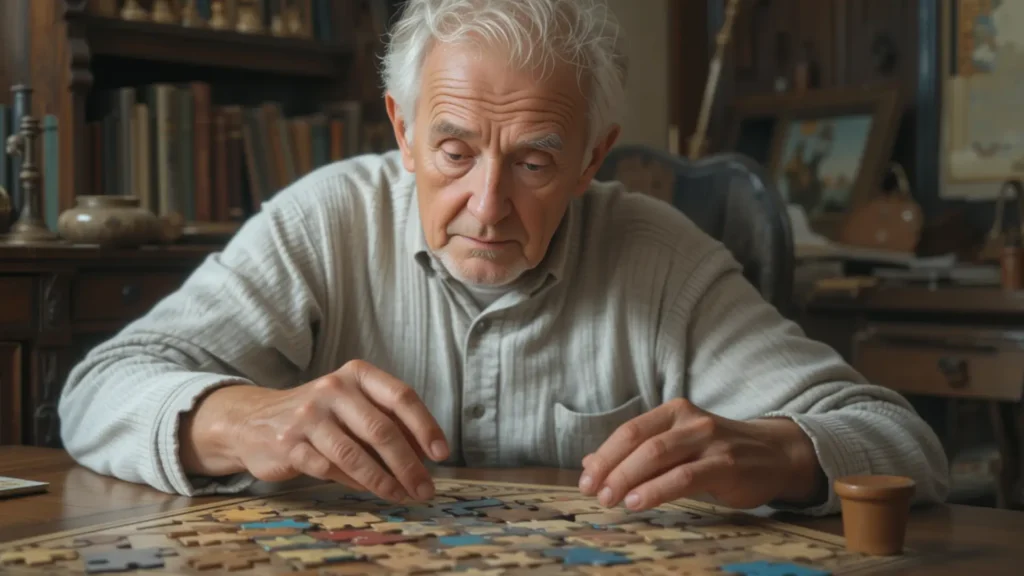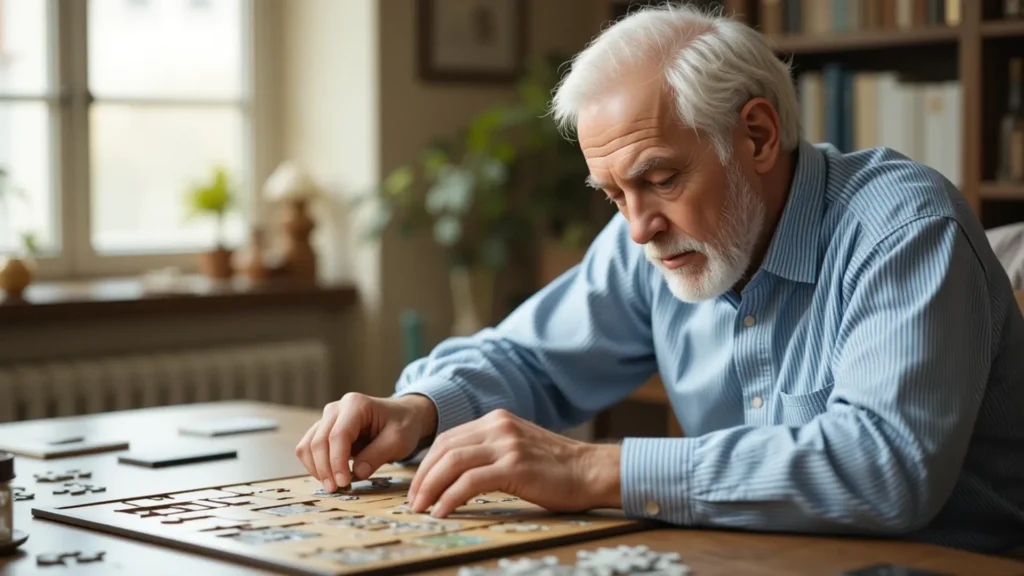You forget what day it is. You lose your train of thought. You walk into a room and can’t remember why. These moments might seem small, but they can be signs your brain is changing.
Many people over 60 worry about memory loss. Some feel helpless watching their mind slow down. But here’s something most don’t realize—there’s a simple way to fight back. It’s not medicine. It’s not expensive. And you can start using it today.
The answer is puzzles.
But not all puzzles help your brain. Some are more powerful than others. In this article, you’ll discover which puzzles work best, how they affect your brain, and how to use them to stay sharp every day.
Why Your Brain Needs a Challenge After 60
As you get older, your brain becomes slower at processing new information. That doesn’t mean you can’t learn or think clearly. It just means you have to feed your brain the right way.
When you stop challenging your mind, the parts responsible for focus, problem-solving, and memory grow weaker. This can lead to confusion, slower reactions, and memory slips.
But the opposite is also true.
When you give your brain new tasks, it builds stronger connections. Think of these as tiny bridges between your thoughts. Each puzzle you solve adds a new bridge, helping you stay sharp and alert.
Most people waste this chance. They keep doing the same things daily. They read the same newspaper. Watch the same shows. Talk about the same topics. Their brain goes into sleep mode.
If you want to protect your mind, you need to wake it up.
Puzzles do exactly that. They force your brain to think, sort, recall, match, and solve. All these tasks activate different parts of your brain—keeping it strong.
And there’s more.
New studies show seniors who work on puzzles score higher in memory, logic, and speed tests. Many continue living independently longer than those who don’t. The change is small at first, but it grows over time.
If you’re looking for simple, fun ways to stay sharp, keep reading. You’ll learn which puzzles work best and how to build them into your daily routine.
The 5 Best Puzzles to Slow Brain Decline
Not every puzzle helps your brain. Some are too easy. Some are repetitive. Some only challenge one part of your thinking. That’s not enough.
If you want to protect your brain, you need puzzles that make you think hard in different ways. You need puzzles that activate your memory, logic, attention, and language—without causing stress or frustration.
Below are the five most powerful types of puzzles for senior brain health. Each one is backed by science. Each one works a different part of your brain. And each one is easy to begin, no matter your age or ability.

Let’s go through them one by one.
1. Crossword Puzzles
Crosswords are more than a word game. They are a full-brain exercise. Each clue pushes your brain to pull out names, dates, places, facts, and common sayings. You connect ideas. You think through meanings. You spell carefully. You recall things you haven’t thought about in years.
This stretches your memory, sharpens your language, and strengthens your ability to focus for long periods. These are the exact skills that fade first with age—but crosswords help keep them alive.
In a long-term study of adults over 60, researchers found that those who solved crosswords four times a week showed much slower memory decline than those who didn’t. In fact, their brains stayed sharper for years longer.
You don’t have to be a puzzle master. Start small. Try beginner puzzles with simple clues. Build your confidence. As you get better, move to puzzles with more challenge. The goal isn’t to finish fast. The goal is to think.
Each time you solve a clue, your brain lights up. It rewards you. That reward keeps you curious and engaged. That’s what protects your mind long term.
Don’t rush. If you don’t finish, that’s fine. Every word you figure out still helps your brain grow stronger.
2. Sudoku
Sudoku is simple to understand but powerful for the brain. You don’t need math skills. You just need to place the numbers 1 through 9 in the right order across rows, columns, and boxes—without repeating them.
This puzzle trains your logic. It sharpens your ability to spot patterns. It teaches your brain how to hold steps in memory while solving problems in order.
Each number you place correctly builds stronger thinking circuits in your brain. This strengthens the parts that help you stay focused, solve problems, and make decisions.
A study on older adults showed that those who played Sudoku regularly had better attention span and faster mental processing. Their minds worked more smoothly, and they stayed alert longer during the day.
Sudoku puzzles are easy to find. You can buy books, print them, or play them on a phone or tablet. Many seniors enjoy starting the day with one. It’s a brain warm-up that only takes 10–15 minutes but sets the tone for a focused, clear-thinking day.
Choose beginner puzzles first. They’ll teach you the patterns. As you get more comfortable, try medium or hard levels to keep stretching your brain.
3. Jigsaw Puzzles
Jigsaw puzzles may look relaxing, but they’re working your brain in big ways. You look at shapes, match colors, track patterns, and figure out where pieces belong. This builds visual memory and spatial reasoning—two skills that decline with age if not used.
Jigsaw puzzles help your brain learn to organize visual details. This sharpens your ability to notice surroundings, track movement, and read facial expressions—skills that help with balance, driving, and social interaction.
In one study, older adults who worked on jigsaw puzzles several times a week showed stronger short-term memory and higher overall brain function scores. The reason? Each piece placed correctly gives your brain a “win.” It sends a signal that progress is happening.
This keeps your mind active and your mood lifted.
Jigsaw puzzles are also calming. They slow your breathing. They reduce stress. And they let you take breaks without losing your place.
Start with a small 100-piece puzzle. Finish it over a few days. Invite others to join. Puzzling with others adds social time, which boosts brain health too. As you gain confidence, try puzzles with more pieces or more complex images.
Each puzzle is not just a game—it’s brain training with joy built in.
4. Logic Puzzles
Logic puzzles are pure thinking exercises. You’re given clues. You’re told what can and can’t happen. And you must use your brain to figure out the answer—step by step.
This pushes your reasoning. It strengthens decision-making. It forces you to hold details in your head and process them in the right order. These are high-level brain functions that decline with age when not used.
Logic puzzles can come in many forms. Classic riddles. Match-the-pair challenges. Puzzle grids with clues. Story-based puzzles with hidden truths. All of these are good for the brain.
You can buy puzzle books made just for seniors. These puzzles are designed with clear instructions, larger fonts, and brain-friendly layouts. Or you can try logic puzzle apps that offer daily challenges.
At first, these puzzles may seem hard. That’s not a problem—it’s a benefit. Your brain builds faster when it struggles a little. Each time you solve one, you grow stronger.
Make a habit of doing one logic puzzle each week. Keep track of your progress. Over time, you’ll notice you’re thinking more clearly in other areas of life too.
5. Word Search Puzzles
Word searches may seem simple, but they do powerful work. You scan a grid. You look for hidden words. You match letters, directions, and shapes. This trains your visual tracking and strengthens memory recall.
The act of scanning in all directions—up, down, diagonal—keeps your eyes and brain in sync. This helps with reading, coordination, and focus. It also improves your ability to spot details in daily life.
Finding a word you know from memory lights up your language center. It wakes up the part of the brain responsible for naming, speaking, and vocabulary.
Word searches are helpful for those who feel slower when speaking or remembering names. Each puzzle you solve helps those skills come back faster.
Try themed word searches to make it more engaging. Pick topics you enjoy—sports, foods, hobbies, cities. This adds personal meaning, which boosts brain activity even more.
Keep a word search book near your reading chair. Do one after lunch each day. Use it as a short brain break that still delivers mental benefits.
Over time, you’ll notice that you’re reading more smoothly, recalling words more quickly, and paying better attention during conversations.
The Secret Is in the Routine, Not the Puzzle
It’s not enough to do puzzles once in a while. For puzzles to protect your brain, you need to make them part of your lifestyle.
That means doing one or more puzzles every single day.
Start small. Do a 10-minute puzzle each morning after breakfast. Try a different type each day. Make it a habit. Over time, it becomes something you look forward to.
You don’t need to solve everything perfectly. The goal isn’t to win. The goal is to think.
Every time you try to solve something, your brain lights up. It connects old information with new ideas. This is how your brain stays young.
Want to speed up the benefits?
Try solving puzzles with others. Do crosswords with your spouse. Share Sudoku puzzles with friends. Finish jigsaws with your grandchildren. The social connection adds another layer of brain protection.
Your routine can look like this:
- Monday: Word search
- Tuesday: Sudoku
- Wednesday: Crossword
- Thursday: Logic puzzle
- Friday: Jigsaw
- Saturday: Mixed brain games
- Sunday: Puzzle break or memory review
Stick to it for 30 days. You’ll notice changes—better focus, faster recall, and sharper thinking.
When Your Brain Feels Clear Again, You’ll Know It’s Working
You’ll know the puzzles are working when you start remembering things more easily. When conversations flow without effort. When reading feels smoother. When your daily tasks feel less draining.
These signs don’t come all at once. They show up slowly. Quietly. But they show up.
And when they do, your confidence returns.
You feel more in control of your mind. More sure of yourself. More aware of your surroundings. You feel mentally alive again.
And there’s something else. Solving puzzles gives you joy. Each time you finish one, your brain rewards you. You feel a little spark of pride. A sense of progress. That spark keeps you coming back.
That spark is the dopamine your brain needs to stay motivated.
This joy is not small. It’s powerful. Because it creates a cycle: more puzzles, more clarity, more energy.
Cognitive decline is not something you must accept. You have more power than you think. Your brain can grow at any age. But it needs help.
Puzzles are that help.
They’re simple. They’re fun. They’re effective. And they cost nothing to try.
You don’t need to be perfect. You don’t need to be fast. You just need to start. One puzzle a day is all it takes to feed your brain and stay sharp.
So pick up a puzzle today. Start where you are. Keep going, one piece at a time.
Your mind is ready.
And it’s waiting for you to take care of it.




